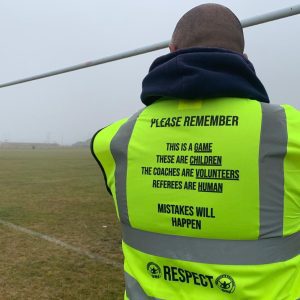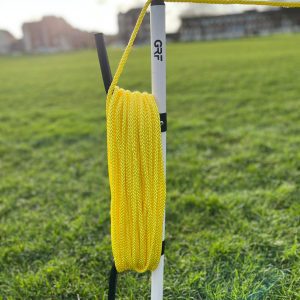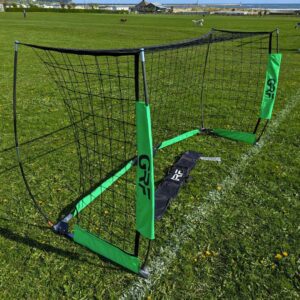We have all been there as parents on many occasions. We have stood in glorious weather and horrific weather, seen many great performances and seen plenty of forgettable ones.
Sometimes we are in great spirits ourselves, have had a good week at work and have not been rushing around like maniacs trying to get our children to all of their scheduled events.
Other times we struggle to know what day of the week it is and arrive at our children’s sporting commitments with seconds to spare having picked up our Costa coffee that helps us get through the next hour, flustered and probably not in the best frame of mind.
So many external factors can have an impact on what we say and how we behave around our children and perhaps none more so than after a match or a training session. I really get it that watching our children play sport is one of the greatest things, particularly when it all goes well and according to plan. However, what happens when things do not or we have had that bad week at work?
Have you ever thought or reflected on how you may behave afterwards with your child or is it dependent on how they have performed or how you are feeling? To some extent of course it is.
Having reflected on this we felt it a good idea that no matter how you may be feeling inside, no matter how bad your week has been, no matter how stressed you are that there are a few questions that you can ask your child that allow both you and them to be positive about the experience that you have just watched, regardless of their performance.

POSITIVE PHRASES AND QUESTIONS YOU COULD SAY OR ASK
‘I love you’ – First and foremost, you are their parent, not their coach. Remind them that your love is not conditional on their performance or the result. The comfort and support that comes from hearing ‘I love you’ will stay with your child long after memories of the match fade.
‘I’m proud of you’ – Research into the fear of failure consistently shows that the fear of shame and disappointment is the biggest in youth sport. Telling your child that you are proud will help reduce their worries that they have let you down.
‘What was the best bit?’ – Even if your child has not performed as well as you may have liked, they will have found something positive. It may be the post match hot dog but it allows them to reflect on the positive part of the experience for them.
‘Did you have fun?’ – Sport is meant to be fun. It is why most kids want to take part. If this is the first question you ask, you’ll reinforce this.
‘Who was your best team mate?’ – Foster a belief in your child that it is about the whole group. Ask them for their opinions and don’t be tempted to interrupt and give them all of yours.
‘What did you think you did well today?’ – Another way to increase intrinsic motivation is to focus on how they performed and not what the score was. Again, this allows them to reflect and think about parts of their own performance that they were in control of.
‘What might you do differently next week?’ – A really important question as this will allow your child to think about some of their mistakes but immediately gives them the opportunity to look ahead and have another go at the following game or training session.
PHRASES AND QUESTIONS TO PERHAPS TRY AND AVOID (NOT ALWAYS EASY!)
‘Did You Win?’ – If you were not’watching, undoubtedly the most common question asked by sporting parents. This immediately tells your child that that is the thing that you value most, yet we know there are far more important things that form your children’s sporting experience. Of course you may want to ask this question, just try not to make it your first one.
‘Did you score?’ – Probably the second most common question asked by sporting parents. Again, it gives the child the impression that the outcome is what you value most. What happens if they made 5 assists, made more tackles and worked harder than any other player?
‘Why Did You Do That?’ – This is all about assigning blame. It is aggressive and your child does not need this type of debrief. Every child will make millions of mistakes and poor decisions, it is really important that we do not put them off making any decisions at all. I know we would like them to learn from their experiences but there are better ways and better times to do this.
‘That was awful’ – This takes the fun out of sport and involves making a judgement call on how they played. At best, you are right that they didn’t play well and this confirms their doubts. At worst, they think they played well and your withering assessment shatters their confidence.
‘False Praise’ – Giving lavish praise can be detrimental to young children. Children can be quite apt at telling when they are being praised for no real reason.
‘You Were So Much Better Than Them/Him/Her’ – Try not to make statements that compare with others. Making comparisons is not a healthy way of helping talent and our children develop.
‘It Doesn’t Matter’ – Of course, in the long run, the performance and result of an U11 match doesn’t really matter; but, at the time, it may matter to your child. It is good to try and provide context, but trivialising the defeat won’t make them feel any better.
Of course, this probably makes a huge amount of sense in the cold light of day, but many things can potentially affect the environment after our children have trained or been involved in a match. Try to keep a couple of the positive phrases up your sleeve! They may be useful as you are calming down and ultimately they will have a far more positive impact on the enjoyment of your child. Remember that is why they are ultimately playing in the first place.
Guest article written by Gordon Maclelland, find out more about Gordons work with parents in sport HERE https://www.parentsinsport.co.uk/

Get 500 for £3 HERE








0 Comments